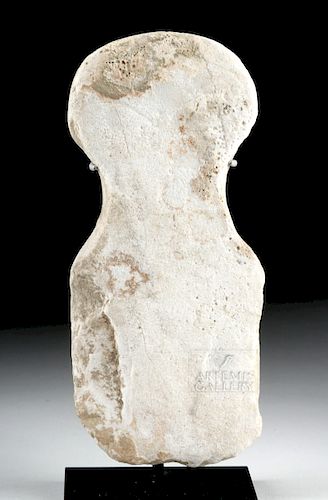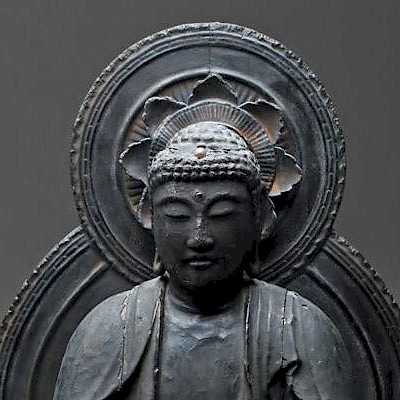Anatolian Marble Idol - Troy Type, Abstract
Lot 104
About Seller
Artemis Gallery
686 S Taylor Ave, Ste 106
Louisville, CO 80027
United States
Selling antiquities, ancient and ethnographic art online since 1993, Artemis Gallery specializes in Classical Antiquities (Egyptian, Greek, Roman, Near Eastern), Asian, Pre-Columbian, African / Tribal / Oceanographic art. Our extensive inventory includes pottery, stone, metal, wood, glass and textil...Read more
Categories
Estimate:
$1,100 - $1,650
Absentee vs Live bid
Two ways to bid:
- Leave a max absentee bid and the platform will bid on your behalf up to your maximum bid during the live auction.
- Bid live during the auction and your bids will be submitted real-time to the auctioneer.
Bid Increments
| Price | Bid Increment |
|---|---|
| $0 | $25 |
| $300 | $50 |
| $1,000 | $100 |
| $2,000 | $250 |
| $5,000 | $500 |
| $10,000 | $1,000 |
| $20,000 | $2,500 |
| $50,000 | $5,000 |
| $100,000 | $10,000 |
| $200,000 | $20,000 |
About Auction
By Artemis Gallery
Jan 7, 2020
Set Reminder
2020-01-07 10:00:00
2020-01-07 10:00:00
America/New_York
Bidsquare
Bidsquare : VARIETY AUCTION - Antiquities / Ethnographic
https://www.bidsquare.com/auctions/artemis-gallery/variety-auction---antiquities-ethnographic-4787
Around the world & back in time - be amazed at the treasures you will find. Antiquities from Egypt, Greece, Italy and the Near East, Asian, Pre-Columbian, African / Tribal / Oceanic, Native American, Spanish Colonial, Russian Icons, Fine Art, much more! Artemis Gallery info@artemisgallery.com
Around the world & back in time - be amazed at the treasures you will find. Antiquities from Egypt, Greece, Italy and the Near East, Asian, Pre-Columbian, African / Tribal / Oceanic, Native American, Spanish Colonial, Russian Icons, Fine Art, much more! Artemis Gallery info@artemisgallery.com
- Lot Description
**Originally Listed At $600**
Ancient Near East, Anatolia, Early Bronze Age I-II, ca. 3200 to 2300 BCE. A wonderfully-preserved Troy-type idol of a simplified, abstract anthropomorphic form, hand-carved from chalky-white marble. The thin idol is carved with a rough rectangular body, a corseted neck, and a simple head with only a pair of lightly-incised eye brows, very faint eyes, and a slender necklace to denote the face. Votive idols like this one are known in a variety of fascinating forms throughout the pre-literate world. From the truly abstract Kilia-type figures that are barely recognizable as human, to the exaggerated feminine shapes of so-called "Venus" figures, people in the past had a clear desire to portray human forms and did not feel constrained by naturalism. Custom museum-quality display stand included. Size: 2.9" W x 6.7" H (7.4 cm x 17 cm); 7.375" H (18.7 cm) on included custom stand.
For a stylistically-similar example with more well-defined facial features, please see "Idols: The Beginning of Abstract Form." Ariadne Galleries, Inc., New York, 1989, p. 57, fig. 14.
Provenance: private East Coast, USA collection; ex-Richard Wagner collection, Cape Cod, Massachusetts, USA, acquired in the 1960s
All items legal to buy/sell under U.S. Statute covering cultural patrimony Code 2600, CHAPTER 14, and are guaranteed to be as described or your money back.
A Certificate of Authenticity will accompany all winning bids.
We ship worldwide and handle all shipping in-house for your convenience.
#143431Losses to parts of original body and peripheries, light encrustations, some calcifications, and softening to facial features. Nice earthen deposits throughout. Old inventory label on verso.Condition
- Shipping Info
-
All shipping is handled in-house for your convenience. Your invoice from Artemis Gallery will include shipping calculation instructions. If in doubt, please inquire BEFORE bidding for estimated shipping costs for individual items.
-
- Buyer's Premium



 EUR
EUR CAD
CAD AUD
AUD GBP
GBP MXN
MXN HKD
HKD CNY
CNY MYR
MYR SEK
SEK SGD
SGD CHF
CHF THB
THB














